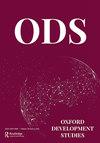Cities, energy and the uncertain future of urban civilization
IF 1.2
Q3 DEVELOPMENT STUDIES
引用次数: 0
Abstract
I will begin by summarizing what I am going to say as a primer for what is to come. I argue that modern cities could not have developed at all without fossil fuels and that today’s urban civilization will find it difficult to persist without fossil fuels. Of course, there is a catch. Fossil fuels are the principal enablers of ‘ecological overshoot’ and its many symptoms, including climate change. Mainstream efforts to address climate change will not only not fix climate change but will also worsen overshoot. Unfortunately, overshoot is a fatal condition. Unless we address overshoot directly, the remaining life of modern urban civilization may well be nasty, brutish and short. Current thinking about urbanization ignores overshoot and is taking us precisely down this Hobbesian pathway. This may seem like a sweeping overstatement, but it does describe humanity’s current trajectory. A dramatic transformation in thinking is essential for urban sustainability. Now to elaborate, most governments and mainstream international agencies think that climate change is the major ‘environmental’ issue and that we can halt climate change. People in highincome countries generally seem to believe that the future will unfold as a technology-enhanced extension of the relatively recent past. We project urban populations to increase to 6.7 billion by 2050. There are supposedly going to be 43 mega cities with more than 10 million inhabitants by 2030 etc. I argue that all such conventional projections are simplistically reductionist. The mainstream prognosis ignores energy and resource constraints, deteriorating geopolitics and the accelerating degradation of the ecosphere. Most urban sustainability efforts are single-focused on mitigating climate change or on so-called ‘smart-city’ initiatives. There is virtually no consideration of the concept of ecological carrying capacity or the need for high-income city dwellers in particular to achieve material standards that are consistent with living on a single planet (i.e. we must reduce consumption to be compatible with ‘one-planet living’). Even those cities that are focusing on reversing climate change are generally falling short in reducing their carbon dioxide emissions. Urbanists commit another major perceptual error. We frequently read that ‘urbanized land constitutes only ~3% of the total land area’ (excluding Antarctica and Greenland), as if Earth were empty and urbanization is not a major factor in global change. But this is, again, static simplicity. Cities are not just dots on a map but also dynamic living systems. An urban ecosystem is globally dispersed far beyond the city proper. A city’s true ecological footprint (EF) is the total area of productive ecosystems that its population requires, on a continuous basis, to produce the bio resources that it consumes and to assimilate its carbon and other wastes wherever on earth those ecosystems may be located. Typically, the eco-footprint of a large modern city is a hundred to a thousand times larger than the geographic or built-up area of that city. A city’s EF is the actual functional area of productive land/water on Earth occupied ecologically by that city’s population. Let us take a typical case, Tokyo, to illustrate ecological reality (it is not quite typical as Tokyo is the world’s largest city). With a population of 38 million – which, by the way, is roughly the population of Canada – and a per capita EF of 4.5 global average hectares (gha), Tokyo’s de facto城市、能源与城市文明的不确定未来
首先,我将总结一下我要讲的内容,作为接下来内容的基础。我认为,如果没有化石燃料,现代城市根本不可能发展起来,而今天的城市文明将很难在没有化石燃料的情况下持续下去。当然,这里有一个陷阱。化石燃料是“生态超载”及其许多症状(包括气候变化)的主要推动者。应对气候变化的主流努力不仅不能解决气候变化问题,而且还会加剧气候过度变化。不幸的是,超调是一种致命的情况。除非我们直接解决过度的问题,否则现代城市文明的剩余生活很可能是肮脏、野蛮和短暂的。当前对城市化的思考忽略了过度,正把我们带向霍布斯的道路。这似乎有点言过其实,但它确实描述了人类目前的发展轨迹。思维的巨大转变对城市的可持续性至关重要。现在详细说明一下,大多数政府和主流国际机构认为气候变化是主要的“环境”问题,我们可以阻止气候变化。高收入国家的人们似乎普遍认为,未来将是相对较近的过去的技术增强延伸。我们预计到2050年城市人口将增加到67亿。据推测,到2030年将有43个人口超过1000万的特大城市。我认为,所有这些传统的预测都是简单化的简化论。主流预测忽略了能源和资源限制、地缘政治恶化和生态圈加速退化。大多数城市可持续发展的努力都集中在减缓气候变化或所谓的“智慧城市”倡议上。几乎没有考虑生态承载能力的概念,也没有考虑高收入城市居民实现与在一个星球上生活一致的物质标准的需要(即我们必须减少消费以适应“一个星球的生活”)。即使是那些专注于扭转气候变化的城市,在减少二氧化碳排放方面也普遍存在不足。城市规划专家还犯了另一个重大的认知错误。我们经常读到“城市化的土地只占陆地总面积的3%”(不包括南极洲和格陵兰岛),好像地球是空的,城市化不是全球变化的主要因素。但这是静态的简单性。城市不只是地图上的点,而是动态的生活系统。城市生态系统在全球范围内分散,远远超出了城市本身。一个城市的真正生态足迹(EF)是其人口需要的生产性生态系统的总面积,在持续的基础上,生产其消耗的生物资源,并吸收其碳和其他废物,无论这些生态系统可能位于地球上的任何地方。通常,一个大型现代城市的生态足迹比该城市的地理或建筑面积大100到1000倍。一个城市的EF是该城市人口在地球上生态占用的生产性土地/水的实际功能面积。让我们以东京为例来说明生态现实(东京是世界上最大的城市,所以不太典型)。东京拥有3800万人口——顺便说一下,这大约相当于加拿大的人口——人均森林资源为全球平均4.5公顷(gha),东京实际上是世界上最富饶的城市
本文章由计算机程序翻译,如有差异,请以英文原文为准。
求助全文
约1分钟内获得全文
求助全文
来源期刊

Oxford Development Studies
DEVELOPMENT STUDIES-
CiteScore
2.70
自引率
0.00%
发文量
20
期刊介绍:
Oxford Development Studies is a multidisciplinary academic journal aimed at the student, research and policy-making community, which provides a forum for rigorous and critical analysis of conventional theories and policy issues in all aspects of development, and aims to contribute to new approaches. It covers a number of disciplines related to development, including economics, history, politics, anthropology and sociology, and will publish quantitative papers as well as surveys of literature.
 求助内容:
求助内容: 应助结果提醒方式:
应助结果提醒方式:


